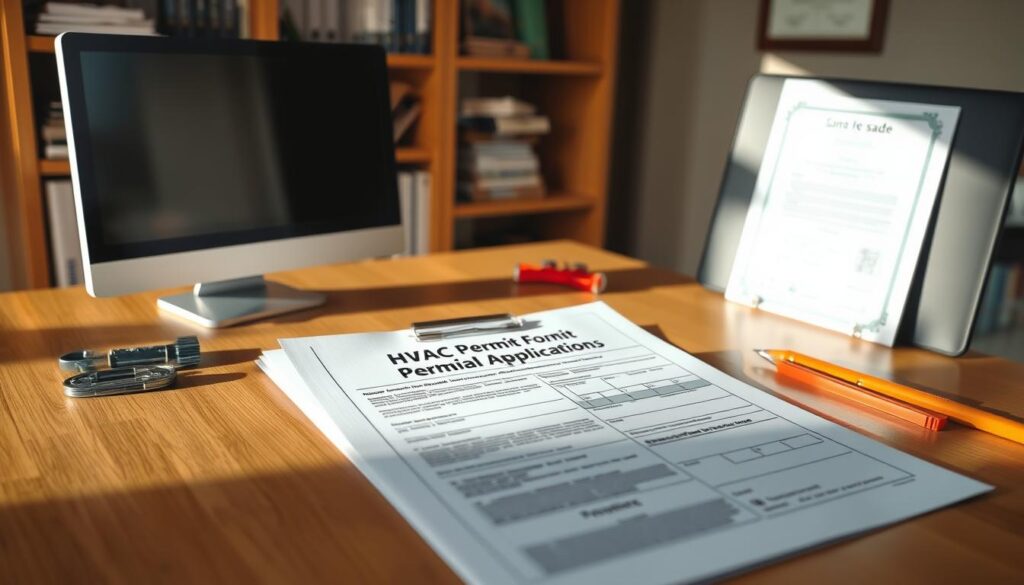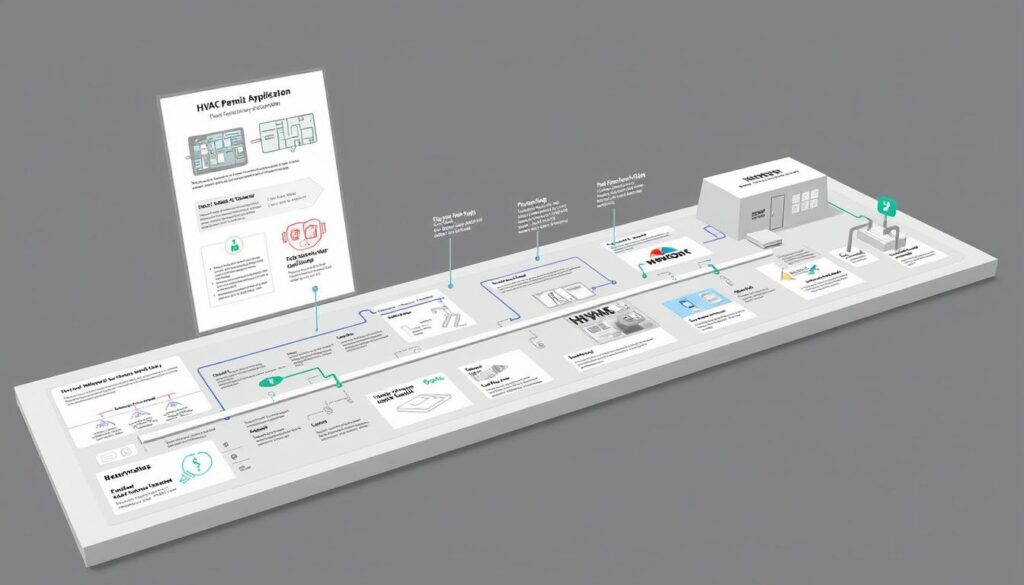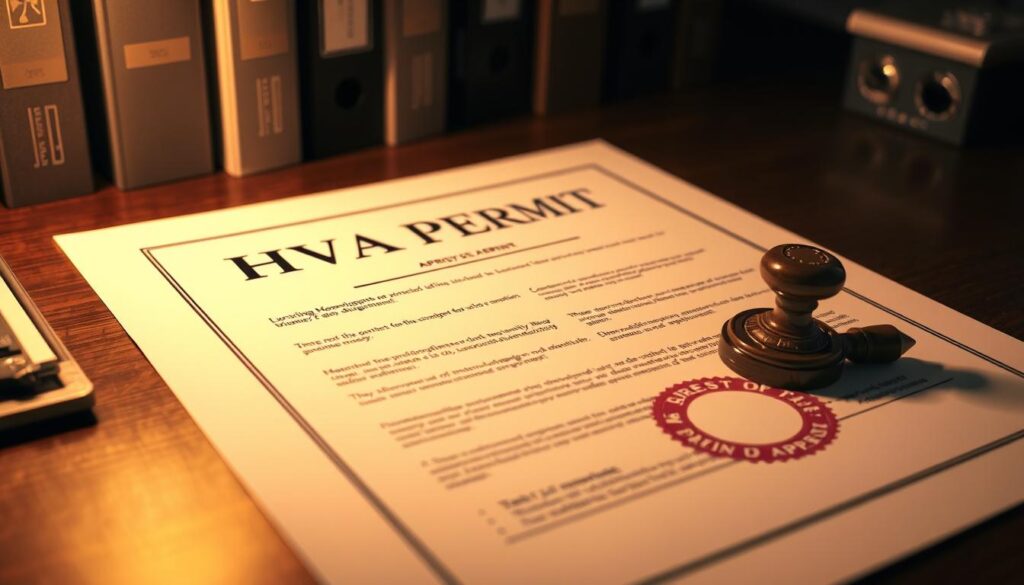Affiliate Disclosure
HVAC Guide Guys is a participant in the Amazon Services LLC Associates Program, an affiliate advertising program designed to provide a means for sites to earn advertising fees by advertising and linking to Amazon.
How to Apply for HVAC Permit? Are you ready to start your HVAC project but don’t know where to begin with permits? Learning about the HVAC permit application process can save you time, money, and avoid legal issues.

Installing, replacing, or modifying your heating, ventilation, and air conditioning system requires the right permit. The steps to apply for an HVAC permit might seem overwhelming. But, with the right help, you can make it easier.
This detailed guide will show you how to get your HVAC permit. We’ll cover everything from local rules to filling out the application. You’ll feel confident moving forward with your project.
Key Takeaways
- HVAC permits protect homeowners and ensure safety standards
- Local building codes vary significantly between jurisdictions
- Proper documentation is essential for permit approval
- Professional contractors can simplify the permit process
- Permit requirements differ for residential and commercial projects
Table of Contents
Understanding HVAC Permit Requirements
Getting HVAC permits can seem tricky, but knowing the basics is key for any HVAC job. Each area has its own rules for heating, ventilation, and air conditioning setups.
Before starting any HVAC work, you must understand the specific permit needs for your project. Different setups need different levels of paperwork and approval.
Types of HVAC Projects Requiring Permits
Not every HVAC job needs a permit. Here are the main times you’ll need official approval:
- New system installations
- Major equipment replacements
- Significant ductwork changes
- Electrical or structural changes related to HVAC
Local Code Compliance and Regulations
Residential HVAC permits vary a lot by area. Your location will decide what paperwork and inspections you need.
| Jurisdiction Level | Typical Permit Requirements |
|---|---|
| City/Municipal | Detailed site plans, equipment specs |
| County | Zoning rules, structural checks |
| State | Energy standards, licensed contractor proof |
Residential vs Commercial Requirements
Commercial HVAC permits are different from residential ones. Commercial projects need:
- More detailed engineering papers
- Load calculations
- Sealed drawings
- Full safety compliance papers
Pro tip: Always check with your local building department to confirm specific needs before starting your HVAC project.
Explore Our HVAC Shop
Looking for top-rated HVAC tools, parts, and accessories? Visit our shop and find the perfect solution for your needs.
Visit the ShopHow to Apply for HVAC Permit: Essential Steps
Getting an HVAC permit can seem tough, but it’s easier when you break it down. You need to know what your local area requires and prepare well for your HVAC project.
Before you start the HVAC permit application, you must do some important steps. Each local area has its own rules to follow. These rules help make the application process smooth.
- Research local building department requirements
- Verify specific HVAC permit regulations in your area
- Gather all necessary documentation
- Confirm contractor licensing and insurance
For a successful permit application, you must prepare well. You’ll need to gather all the project details, like:
- Precise equipment specifications
- Detailed installation plans
- Contractor credentials
- System performance calculations
Your local building department will need certain documents to process your HVAC permit. Accuracy is crucial to avoid delays or rejections.
| Document Type | Required Information |
|---|---|
| Technical Drawings | Detailed system layout and specifications |
| Energy Calculations | Load calculations and efficiency ratings |
| Contractor Information | License numbers and insurance details |
Understanding the HVAC permit application process early can save you a lot of time and trouble. Each area has its own rules, so always check with your local building department.
Explore Our HVAC Shop
Looking for top-rated HVAC tools, parts, and accessories? Visit our shop and find the perfect solution for your needs.
Visit the ShopGathering Required Documentation
Getting your hvac permit documentation ready is key to the mechanical permit application. The right papers can make your HVAC project approval go smoothly. Preparing well helps avoid delays and makes the submission process easier.
Your package should be complete and well-organized. Local building departments have specific needs that must be followed closely.
Construction Plans and Drawings
Detailed construction plans are crucial for your mechanical permit application. These documents should include:
- Precise system layout
- Equipment location specifications
- Dimensioned floor plans
- Ventilation and ductwork details
Contractor Licenses and Insurance
It’s important to show your contractor’s professional credentials for hvac permit documentation. You’ll need to gather:
- Current state contractor license
- Liability insurance certificates
- Workers’ compensation documentation
Equipment Specifications
Having detailed equipment information is vital for your mechanical permit application. Prepare the following specifications:
| Document Type | Required Information |
|---|---|
| HVAC Unit Specifications | Model number, efficiency ratings, BTU capacity |
| Manufacturer Details | Brand, serial numbers, installation guidelines |
| Energy Performance | SEER rating, energy consumption data |
Pro tip: Double-check all documentation for accuracy before submission to prevent potential processing delays.
Calculating Permit Costs and Fees
Knowing the cost of HVAC permits is key to planning your project budget. The fees can change a lot based on several important factors. These factors affect how you get your HVAC permits.
The cost of HVAC permits depends on:
- Project scope and complexity
- Total square footage of installation
- Local municipal regulations
- Type of HVAC system being installed
Residential HVAC permits usually cost between $250 and $1,500. Commercial projects might cost much more, up to $5,000 or more. Where you live greatly affects the cost.
Important costs for getting HVAC permits include:
- Base permit fee
- Inspection charges
- Plan review expenses
- Additional administrative costs
To avoid surprises, talk to your local building department about exact costs. Some places have online fee calculators. These can help you guess your HVAC permit costs more accurately.
Pro tip: Always budget an extra 10-15% above the estimated permit cost for potential unexpected fees.
Explore Our HVAC Shop
Looking for top-rated HVAC tools, parts, and accessories? Visit our shop and find the perfect solution for your needs.
Visit the ShopCompleting the Permit Application Form
Understanding the HVAC permit application process can be tough. Knowing the important parts of your mechanical permit application makes it easier. It’s key to fill out your permit form right to avoid delays and get approval quickly.
When you’re getting ready to apply for a mechanical permit, focus on a few important things:
- Comprehensive project details
- Precise equipment specifications
- Accurate contractor information
- Complete site plans
Common Application Mistakes to Avoid
Many people run into problems when applying for an HVAC permit. Stay away from these common mistakes to avoid trouble:
- Submitting incomplete documentation
- Providing outdated contractor license information
- Failing to include detailed system specifications
- Neglecting to sign required sections
Information Required for Submission
Your mechanical permit application needs some important details:
- Property owner’s complete contact details
- Detailed HVAC system specifications
- Professional contractor licensing credentials
- Comprehensive site and installation plans
Digital vs Paper Applications
Most places prefer digital submissions for HVAC permits now. Online applications have big benefits:
- Faster processing times
- Easier document tracking
- Immediate confirmation of receipt
- Reduced paperwork
“Accuracy is the key to a successful permit application. Take your time and double-check every detail.” – Local Building Permit Official
Choosing the right way to submit your application can make a big difference. Make sure to check what your local building department needs for a smooth process.
Permit Review Process and Timeline

Understanding the HVAC permit review process is key to planning your project well. The time it takes to get a permit can change based on several factors. These factors affect how quickly and complex the process is.
Local building departments have a set way to review HVAC permit applications. Your documents will go through several checks:
- Initial document screening
- Technical plan review
- Code compliance assessment
- Final approval determination
The time it takes to review your application can be from two weeks to three months. This depends on:
- How complex your HVAC installation is
- The current workload of the department
- If all documents are complete and correct
- The speed of the local jurisdiction
To speed up your application, make sure all documents are right and complete. Also, meet local building code standards. Plan ahead and apply early to avoid delays.
Pro Tip: Contact your local building department to understand specific review timelines and potential expediting options.
Explore Our HVAC Shop
Looking for top-rated HVAC tools, parts, and accessories? Visit our shop and find the perfect solution for your needs.
Visit the ShopScheduling Required Inspections
Getting through the inspection process for HVAC installation permits can be tough. Local hvac permit rules need detailed checks to make sure your system is safe and works well. Knowing about these inspections helps you get ready and make the process easier.
Inspections are key points in your HVAC installation project. They check if your work follows local building codes and safety rules.
Pre-installation Inspection Requirements
Before starting your HVAC project, you must schedule an initial site inspection. This important step includes:
- Checking the current structure
- Confirming electrical and ventilation setup
- Ensuring equipment is in the right place
- Looking over the initial installation plans
Final Inspection Checklist
Your final inspection makes sure you meet all hvac installation permit rules. Inspectors will look at:
- How well the system works and its efficiency
- If the equipment is installed correctly
- The electrical connections
- The ductwork’s condition
- If safety features work right
Common Inspection Points
Experienced HVAC pros suggest getting ready for these usual inspection areas:
- Refrigerant line connections
- Electrical wiring compliance
- Ventilation system alignment
- Equipment mounting stability
By knowing local hvac permit rules and preparing well, you can handle inspections with confidence. This ensures a smooth HVAC installation process.
Understanding Permit Approval Conditions

When you get hvac permits, you’ll get a detailed document. It outlines specific approval conditions. These conditions are key to making sure your HVAC project follows local rules and building codes.
Permit approval conditions cover a few main areas. You need to review and understand them well:
- Project timeline and completion deadlines
- Specific installation requirements
- Work hour restrictions
- Safety and code compliance standards
Your approved permit will have precise specifications for your HVAC installation. These conditions protect homeowners and contractors. They set clear expectations and safety rules.
| Condition Type | Key Requirements | Potential Consequences of Non-Compliance |
|---|---|---|
| Installation Standards | Follow manufacturer specifications | Permit revocation |
| Inspection Requirements | Schedule mandatory inspections | Fines and project delays |
| Equipment Specifications | Use approved equipment models | Potential re-installation costs |
To avoid violations, read and understand every condition in your permit. If something is unclear, ask your local building department for help. This is before you start your HVAC installation project.
Explore Our HVAC Shop
Looking for top-rated HVAC tools, parts, and accessories? Visit our shop and find the perfect solution for your needs.
Visit the ShopMaintaining Compliance During Installation
Following local hvac permit rules is key during your HVAC installation. Your success relies on sticking to the approved permit guidelines from start to finish.
To keep up with compliance, pay close attention to several areas. Your project supervisor must track and document each step of the installation. This ensures you follow the hvac installation permits.
- Review approved installation plans regularly
- Document all modifications and changes
- Keep detailed project logs
- Maintain on-site permit documentation
Important steps for keeping up with regulations include:
- Verify contractor credentials before work starts
- Ensure all equipment matches permit specs
- Schedule mandatory inspections at key milestones
- Inform local building authorities about project updates
| Compliance Area | Key Requirements |
|---|---|
| Documentation | Maintain comprehensive project records |
| Inspections | Complete all required local inspections |
| Equipment | Use permitted and approved HVAC systems |
Keeping in touch with local building departments can avoid compliance problems during your HVAC installation.
Successful HVAC installations focus on following rules at every project stage.
Conclusion
Getting an HVAC permit needs careful planning and detail. Learning how to apply for one protects your property and investment. It also helps avoid legal issues and ensures your system is safe.
Your success in getting a permit starts with good preparation. You need to have all the right documents and know the local building codes. Working with licensed pros can help you through each step.
Every place has its own rules for HVAC permits. Knowing these rules saves you time and effort. By following this guide, you’ll know how to get your permit easily and accurately.
The HVAC permit process makes sure installations are safe and work well. Seeing it as a chance to show your commitment to quality is key. With the right preparation, you’ll get your permit and start your HVAC project.
FAQ
Do I always need a permit for HVAC work?
How long does the HVAC permit application process usually take?
What documents do I need to apply for an HVAC permit?
How much does an HVAC permit cost?
Do I always need a permit for HVAC work?
How long does the HVAC permit application process usually take?
What documents do I need to apply for an HVAC permit?
How much does an HVAC permit cost?
FAQ
Do I always need a permit for HVAC work?
Not all HVAC projects need permits. But, most installations, replacements, and big changes do. Small fixes or upkeep usually don’t need a permit. Still, it’s smart to check with your local building department to see what your project needs.
How long does the HVAC permit application process usually take?
The time it takes to get a permit varies. It usually takes 2-4 weeks. But, big commercial projects might take longer. Smaller home jobs could be faster. How fast it goes depends on how complete your application is and how busy the department is.
What documents do I need to apply for an HVAC permit?
You’ll need to provide a lot of information. This includes detailed plans, equipment specs, and proof of insurance. You’ll also need contractor licenses and site drawings. Your local building department can give you a full list of what you need.
How much does an HVAC permit cost?
Permit costs change based on where you are, the project, and how complex it is. Home permits usually cost between and 0. Commercial permits can be 0 to
FAQ
Do I always need a permit for HVAC work?
Not all HVAC projects need permits. But, most installations, replacements, and big changes do. Small fixes or upkeep usually don’t need a permit. Still, it’s smart to check with your local building department to see what your project needs.
How long does the HVAC permit application process usually take?
The time it takes to get a permit varies. It usually takes 2-4 weeks. But, big commercial projects might take longer. Smaller home jobs could be faster. How fast it goes depends on how complete your application is and how busy the department is.
What documents do I need to apply for an HVAC permit?
You’ll need to provide a lot of information. This includes detailed plans, equipment specs, and proof of insurance. You’ll also need contractor licenses and site drawings. Your local building department can give you a full list of what you need.
How much does an HVAC permit cost?
Permit costs change based on where you are, the project, and how complex it is. Home permits usually cost between $50 and $500. Commercial permits can be $100 to $1,500 or more. The cost also depends on the system size and local fees.
Can I install an HVAC system myself?
In most places, you need a licensed HVAC contractor for installations. This ensures safety and follows codes. Some areas might let homeowners do it themselves, but most recommend hiring a pro because of the technical and safety challenges.
What happens if I install an HVAC system without a permit?
Installing without a permit can lead to big problems. You could face fines, have to remove the system, and deal with legal issues. It can also affect insurance claims, home sales, and property assessments. Always get the right permits before starting.
How long is an HVAC permit valid?
Permit validity varies but is usually 6 months to 1 year. You must start work within a certain time and finish before it expires. If you can’t finish on time, you might need an extension or to reapply.
Do I need separate permits for different aspects of HVAC installation?
It depends on where you are. You might need different permits for electrical, structural, and mechanical work. Some places have one permit for everything, while others need separate ones for each part.
What inspections are typically required for HVAC permits?
HVAC permits usually need at least two inspections. One is before installation to check the site, and the other is after to make sure it’s done right. You might need more inspections for electrical or refrigerant work.
Can I transfer an HVAC permit if I change contractors?
Whether you can transfer a permit depends on local rules. Some places let you transfer with the right documents, while others require a new application. Always check with your local building department to see what they say.
,500 or more. The cost also depends on the system size and local fees.
Can I install an HVAC system myself?
In most places, you need a licensed HVAC contractor for installations. This ensures safety and follows codes. Some areas might let homeowners do it themselves, but most recommend hiring a pro because of the technical and safety challenges.
What happens if I install an HVAC system without a permit?
Installing without a permit can lead to big problems. You could face fines, have to remove the system, and deal with legal issues. It can also affect insurance claims, home sales, and property assessments. Always get the right permits before starting.
How long is an HVAC permit valid?
Permit validity varies but is usually 6 months to 1 year. You must start work within a certain time and finish before it expires. If you can’t finish on time, you might need an extension or to reapply.
Do I need separate permits for different aspects of HVAC installation?
It depends on where you are. You might need different permits for electrical, structural, and mechanical work. Some places have one permit for everything, while others need separate ones for each part.
What inspections are typically required for HVAC permits?
HVAC permits usually need at least two inspections. One is before installation to check the site, and the other is after to make sure it’s done right. You might need more inspections for electrical or refrigerant work.
Can I transfer an HVAC permit if I change contractors?
Whether you can transfer a permit depends on local rules. Some places let you transfer with the right documents, while others require a new application. Always check with your local building department to see what they say.

